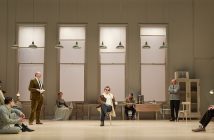After the truly shattering disappointment of Tom Stoppard’s newest play, The Hard Problem, it was a relief to head to the Brighton Theatre Royal in the certain knowledge that Arcadia, being revived by ETT and the theatre in the first co-production, is a cast iron classic. It was voted the nation’s fourth favourite play in a recent poll (between Hamlet and The Importance Of Being Earnest), and works in the way that Stoppard’s best plays do; brilliant one-liners and hilarious moments of repartee and innuendo jostle alongside intellectual fireworks and a genuinely original central conceit. Its director Blanche McIntyre has delivered a respectable, respectful revival that will please anyone seeing it for the first or fifth time, albeit with a couple of casting blunders that spoil at least some of the effect.
For anyone who hasn’t been lucky enough to see it before, the central conceit of Arcadia – and a brilliant one – is to set it in two time frames, 1809 – 1812 and then the present day, both at the fictional manor house Sibley Park in Derbyshire. In the past, the dashing young tutor Septimus Harding tries to deal with his preternaturally gifted pupil Thomasina, while pining for her withering mother Lady Croom. In the present day, academics Hannah and Bernard clash over the likelihood that Lord Byron had been a visitor to Sibley Park, and his possible involvement in a fatal duel there. Comedy, drama and discussions of the infinite ensue.
Stoppard’s play is sufficiently robust to withstand the (minor) criticisms that can be levelled at it; there’s a long, rather uninteresting scene in which the young scientist Valentine (‘Brideshead Regurgitated’, as Bernard quips) tries to explain the principles of thermodynamics that suffers because it is more of a lecture than a dramatic scene, and, in this revival, Bernard’s entanglement with Chloe, the young daughter of the house, might strike audiences as somewhat creepy. Set against this is the joyful experience that it engenders of being interested by a well-plotted mystery, set against an increasingly moving love story between Septimus and Thomasina, which, as the play moves to its conclusion, can only end badly for both parties.
McIntyre’s staging whips along relatively briskly, helped by several excellent performances. Flora Montgomery slightly overdoes the double-takes of indignation at Bernard’s general absurdity, but is intelligent, touching and likeable as Hannah, the moral and physical centre of the play. As the preening, pompous academic, Robert Cavanah enjoys himself enormously; I’ve seen subtler interpretations of the character, but the mixture of ambition and lechery is beautifully conveyed. In the 19th century scenes, Kirsty Besterman gives it her best Lady Bracknell as Lady Croom, tossing off Stoppard’s repartee as if to the manor born, and Wilf Scolding is suitably Byronic and dashing as Septimus.
There are a couple of rather flat performances in the supporting roles, and it would be unfair to name and shame the actors involved, but this revival’s major problem is the casting of the excellently named Dakota Blue Richards as Thomasina. She certainly has the right look, pitched somewhere between ethereality and beauty, but severe problems with audibility and diction mean that it’s hard to hear most of what she’s saying (a common grumble at the interval), meaning that the play is robbed of its heart. The conclusion is, inevitably, affecting, but it’s telling that the use of Jeff Buckley’s ‘Lover, You Should Have Come Over’ gives an emotional heft that only some of the performances really justify. Still, for all its flaws, this is an enjoyable evening and it’s always good to see a play of this calibre embarking on an extensive national tour; Stoppard in a theatre near you is always a thing to be encouraged.
Touring until April 2015. For more information and tickets, visit the website.




